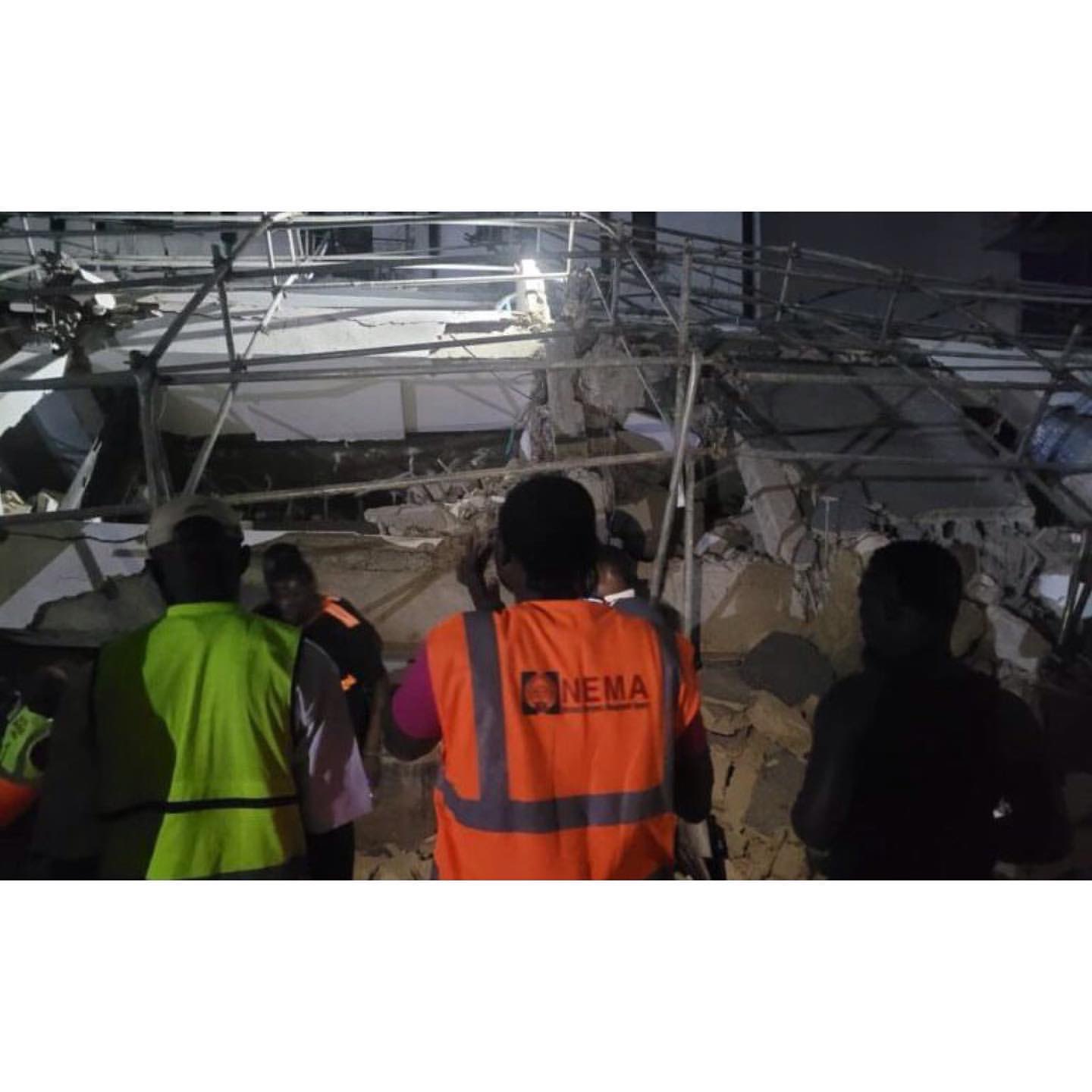
Terror in Yaba as Three-Storey Building Collapses, Rescue Efforts Continue Amid Uncertainty

A horrifying tragedy unfolded on Friday night, September 12, 2025, when a three-storey building under construction collapsed at 333 Borno Street, Alagomeji, Yaba, Lagos, sending shockwaves across the state and once again raising troubling questions about the safety of lives and properties in Nigeria’s bustling commercial hub. The building, which came crashing down around 8:30 p.m., left several people trapped under the rubble, with rescuers racing against time to save lives as distraught residents gathered in fear and confusion. According to the National Emergency Management Agency (NEMA), conflicting eyewitness reports made it difficult to ascertain the exact number of those buried under the collapsed structure. While some accounts suggested that six people were trapped, others put the figure at five. What is clear, however, is that four adult males have been successfully rescued alive from the wreckage and rushed to hospital for urgent medical care, offering a glimmer of relief amid the chaos.
The incident triggered an immediate multi-agency response as NEMA, the Lagos State Emergency Management Agency (LASEMA), the Lagos State Fire and Rescue Service, and other first responders stormed the site to commence search and rescue operations. Working through the night, rescue teams deployed heavy equipment, floodlights, and cutting tools, carefully sifting through the massive debris in hopes of locating survivors. The site has since been cordoned off to prevent further casualties and allow unhindered rescue activities, as anxious family members and residents watch on, praying for a miracle.
Speaking to reporters, officials stressed that the number of those still trapped remains uncertain, but every effort is being made to ensure no stone is left unturned. Emergency workers were seen calling for silence at intervals as they listened for faint cries or movements that might indicate trapped survivors. At the same time, paramedics and ambulances stood by to provide immediate medical assistance. The collapse left mangled iron rods, broken concrete, and clouds of dust scattered across the area, with the once-promising structure now reduced to a graveyard of twisted ruins.
This tragedy is not an isolated incident but part of a grim pattern that has plagued Lagos and several other Nigerian cities for years. Building collapses, particularly involving structures under construction, have become disturbingly frequent, with experts blaming them on poor construction practices, substandard building materials, and weak regulatory enforcement. Each time such disasters occur, lives are lost, families are shattered, and the public is left demanding accountability. Data from government agencies and civil society organizations reveal that dozens of buildings collapse annually in Lagos alone, often with devastating consequences. Despite repeated warnings from authorities and consistent promises of stricter enforcement, the problem persists like a recurring nightmare.
The Lagos State government has in the past sealed many buildings found to have contravened safety regulations or failed structural integrity tests, but unscrupulous developers and builders often circumvent these orders, resuming construction under the radar. Questions are now being asked about whether the Yaba structure had been flagged for non-compliance, and if so, how it managed to continue rising unchecked. Residents of the area told reporters that the speed of construction raised suspicions, with whispers about shortcuts being taken to cut costs. Some claimed they had noticed cracks and unusual signs before the eventual collapse, while others said they were simply shocked by how suddenly the structure gave way.
As the rescue operations continue, social media has been flooded with heartbreaking footage and images from the site. Videos show emergency lights piercing through the darkness as rescuers dig frantically, while anguished relatives cry out the names of loved ones believed to be trapped. The fear, uncertainty, and desperation are palpable, with many describing the scene as both heartbreaking and infuriating. Nigerians have taken to online platforms to express anger over yet another avoidable disaster, demanding that those responsible be held accountable and that systemic reforms be urgently implemented.
Medical workers at nearby hospitals have confirmed receiving the rescued victims, with doctors assuring that they are receiving adequate treatment. However, the physical and emotional toll of being trapped under rubble can be severe, raising concerns about long-term recovery. The fate of those still trapped remains unknown, and with each passing hour, the chances of survival diminish, further intensifying the urgency of the rescue operations.
Community leaders in Yaba have called for calm, urging residents not to obstruct the rescue mission while also pressing authorities to ensure thorough investigations into the collapse. Many fear that the cycle of collapses, inquiries, and forgotten promises will repeat itself unless drastic action is taken. The Lagos State government has in the past set up panels of inquiry to investigate such disasters, but implementation of recommendations has often been slow or inconsistent, leaving the public disillusioned.
Nigeria’s construction industry continues to grapple with credibility issues, with allegations of widespread corruption, inadequate supervision, and lack of compliance with building codes dominating conversations after each collapse. Civil engineers and experts have often lamented that many developers ignore professional advice, relying instead on quacks or unqualified contractors who cut corners to save costs. In a city like Lagos, where rapid urbanization has created a high demand for housing, the pressure to build quickly and cheaply often outweighs the commitment to safety. Unfortunately, it is ordinary citizens, workers, and tenants who pay the ultimate price when these structures come crashing down.
For residents of Alagomeji, Yaba, the collapse has not only caused loss and fear but also disrupted lives in the immediate environment. Businesses near the site have been forced to shut down temporarily, traffic diversions have been implemented, and the once-bustling street has become a restricted zone filled with sirens, flashing lights, and the constant hum of machinery. Neighbors now live with a lingering fear, wondering if other buildings around them are safe or if they too are potential death traps waiting to crumble.
As dawn breaks on Lagos, the focus remains squarely on saving lives. Emergency officials have vowed to continue rescue operations until every possible survivor is accounted for. Meanwhile, public outcry is mounting, with calls for the Lagos State government to not only investigate the Yaba collapse thoroughly but also to make a clear example of those found culpable. Activists argue that until developers and officials responsible for such tragedies face real consequences, Nigerians will continue to live in fear of their own homes turning into tombs.
The collapse of the three-storey building in Yaba is another painful reminder of the fragility of life and the urgent need for reforms in Nigeria’s construction sector. While families wait in agony for news of their loved ones, the larger society waits for justice, hoping that this time, the tragedy will not be swept aside as just another statistic. For now, the rubble at Borno Street stands as both a grave warning and a monument to negligence, a symbol of a system that has repeatedly failed to protect its people. The coming days will reveal not only the full human cost of this disaster but also whether authorities will finally rise to the challenge of ending the deadly cycle of building collapses in Lagos.

